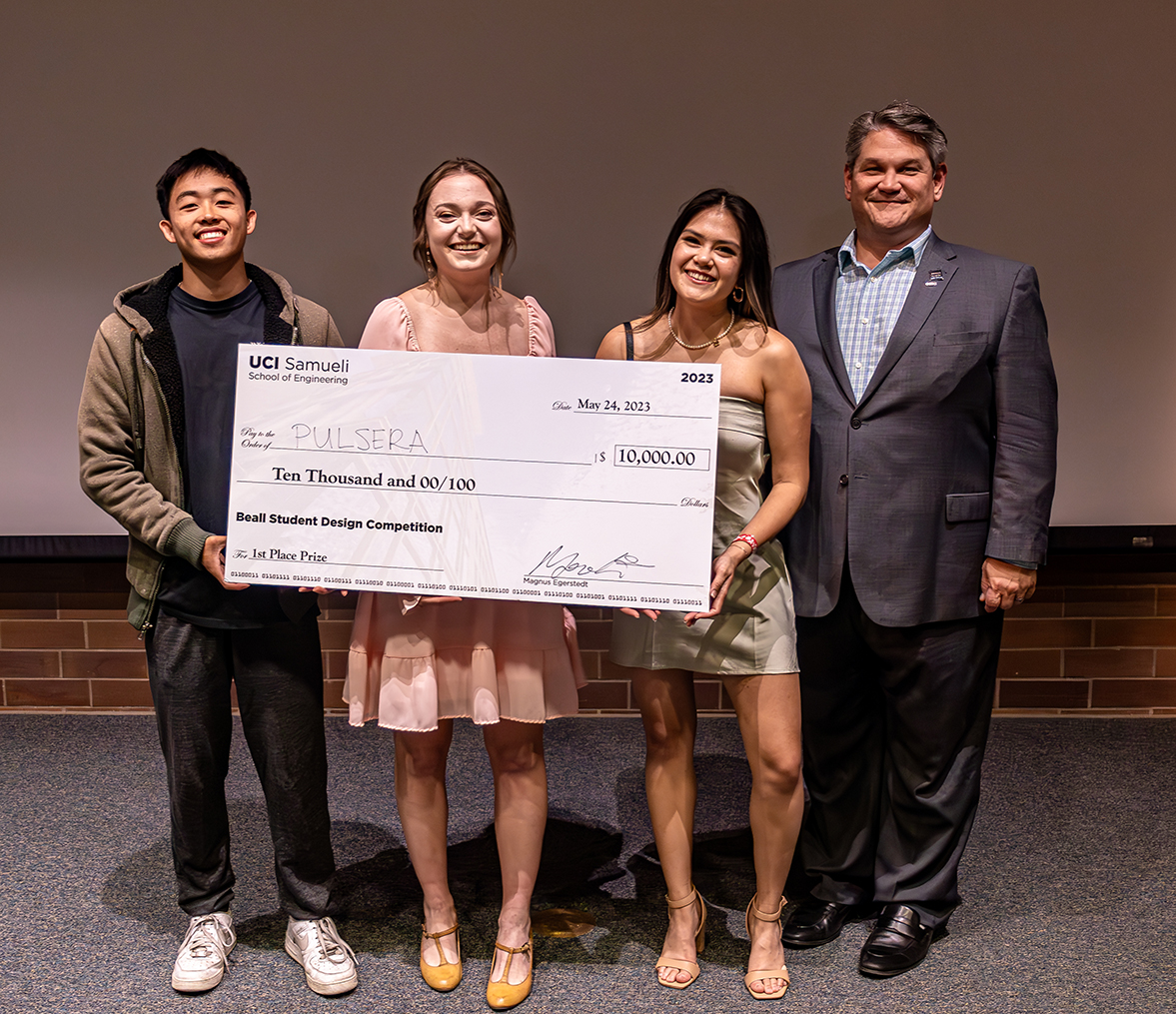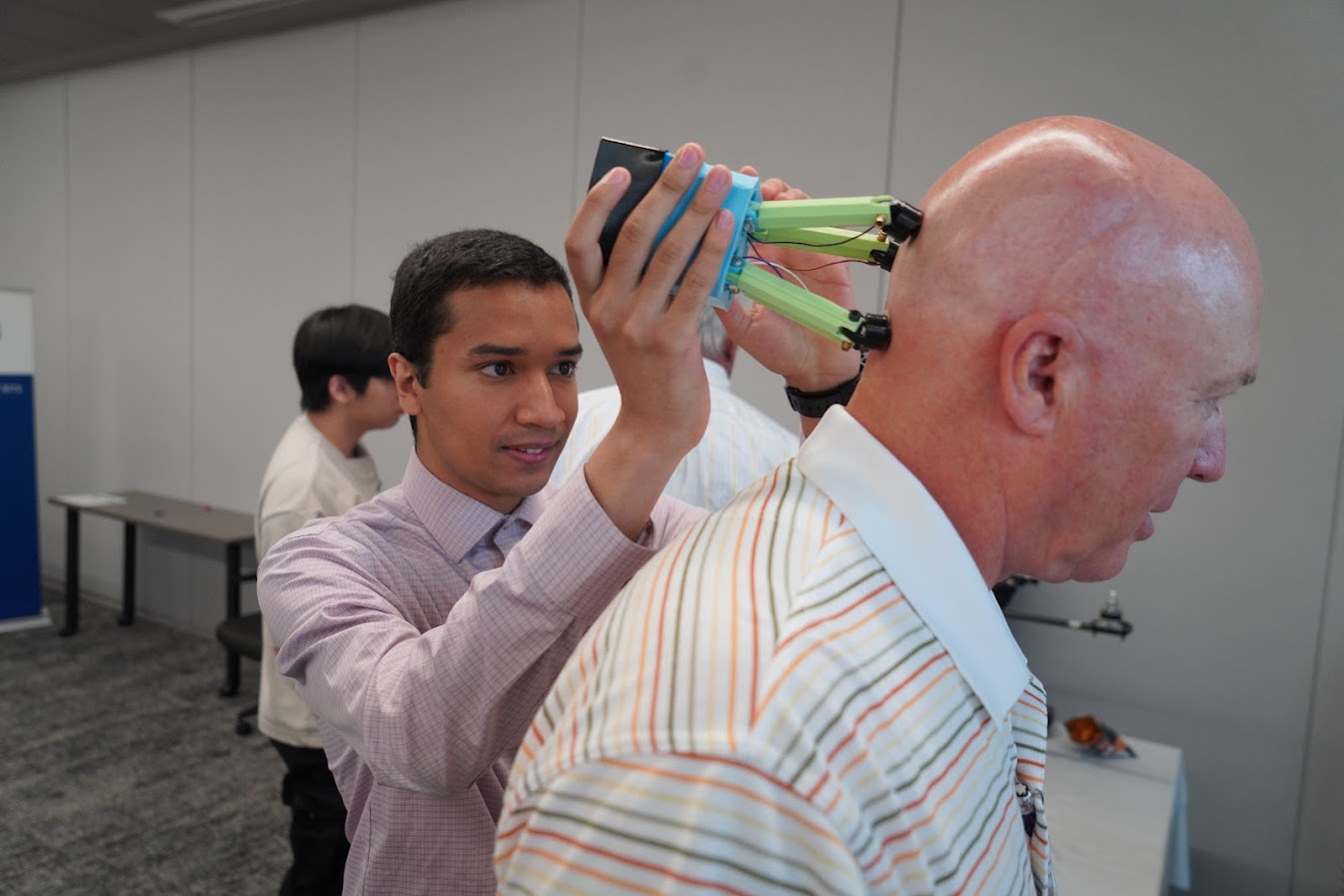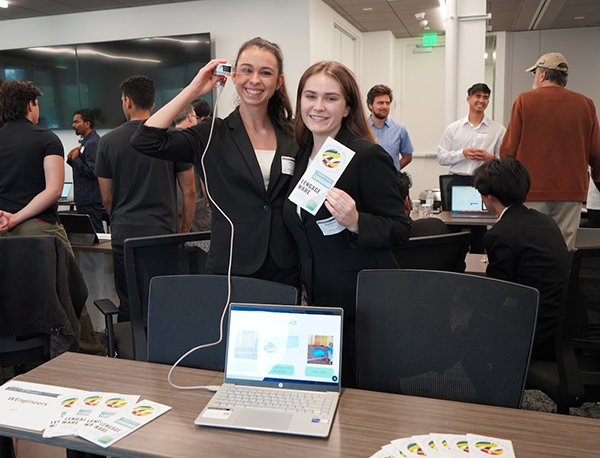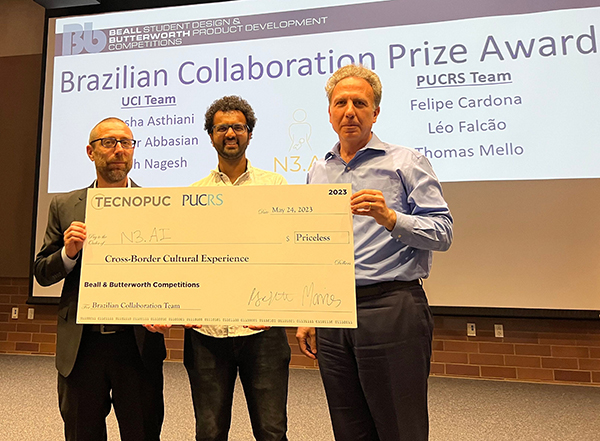Beall Butterworth Competition Results Announced

Pictured, from left, are biomedical engineering students who won first place for their product Pulsera: Ryan Hsu, Claire Livengood and Nicolette Fulcomer with David Ochi, board member of the Beall Center for Innovation and Entrepreneurship. Photo courtesy of Anthony Herrera Zarate.
June 28, 2023 - The ninth annual Beall and Butterworth Product Design Competition culminated with an awards ceremony at Calit2 on May 24, and many engineering students received prizes for their designs. The awards included a first, second and third place for both tracks, the Beall Student Design Competition for engineering and the Butterworth Product Development Competition for information and computer sciences. The engineering side focuses on solving current design problems and developing technology while the information and computer science side centers on creating new software and computing technologies.
Thirteen Beall and 16 Butterworth teams participated, and the judges were industry specialists, entrepreneurs and UCI faculty. The six-month contest includes multiple design and coaching workshops and a demo day where the teams present their prototypes.
“This competition is truly a celebration of what we can dream up when we get together,” said Samueli School Dean Magnus Egerstedt. “It is a roadmap for what we want to achieve moving forward.”

Second-place Beall team Encephalopod demonstrates how to use their portable EEG to detect stroke and seizure at Demo Day. Photo courtesy of Matthew Miller
The first-place winner in the Beall Competition was team Pulsera. The students won $10,000 for their slipper designed to help pregnant women detect their risk for preeclampsia, a high blood pressure disorder that can cause organ malfunction in the third trimester or postpartum. The slipper contains a built-in oximeter and blood pressure sensor and would allow women to monitor their risk at home instead of going to a medical facility. There are more than 400,000 cases of preeclampsia in the United States annually, but it can be detected earlier by analyzing a patient’s vitals.
“We want to use the prize money to further develop our prototype and create a final version,” said team member Nicolette Fulcomer, a biomedical engineering student. “Then we’ll try to push it out to market and begin testing it. Hopefully, it can start helping people as soon as possible.”
The Beall Competition’s second place prize of $6,500 went to Encephalopod. The team presented their prototype for a portable EEG, a noninvasive medical device that can detect a seizure or stroke by measuring abnormalities in brain waves. While existing EEG devices are larger and take several minutes to record brain activity, requiring a specialized technician to operate, Encephalopod’s EEG consists of a cube with four prongs that can scan for abnormalities in 30 seconds when held to the patient’s head. Since the portable design can be used without a technician, it could allow emergency medical personnel to begin treating a patient before reaching a hospital.

Kristin Hagen (left) and Madeleine Marston present Lengage Ware at Demo Day. Photo courtesy of Matthew Miller.
WEngineers/Lengage Ware took third place and $3,500 with a device that clips on to glasses; it translates live audio and displays a transcript across the glasses’ lenses. The team hopes the product can help overcome language barriers between first responders and patients since it allows the user to maintain eye contact with the speaker while their speech is being translated.
“The competition has been a lot of fun, and I think what we’re working toward is really important,” said Kristin Hagen, a first-year biomedical engineering undergraduate who is the CEO of Lengage Ware. “I want to continue working on the prototype until I’m ready to start a company.”
The Butterworth teams presented a variety of software and app designs. The first-place winner was Eupnea, an AI-based app for diagnosing tuberculosis. Second prize went to Nibble, an app tailored to make dining recommendations for groups based on the individual users’ preferences, and ChewRank, a system for ranking restaurants, placed third.

Pictured from left, Dean Magnus Egerstedt, N3.AI team member Nitish Nagesh and Dean Marios Papaefthymiou. Photo courtesy of Brian Dao.
The competition also featured an international track where UCI students partnered with students from Brazil’s Pontifical Catholic University of Rio Grande do Sul to form 17 teams. The groups connected remotely to design their products and align their business cases to international markets. The judges selected team N3.AI as the winner based on both the product and the members’ overall cooperation skills. N3.AI presented an app for pregnant women and new mothers to monitor and improve their mental health through diet tracking and mindfulness activities. Instead of receiving money, the team’s six members will conduct exchange work at each other’s universities.
“We are excited to do more customer discovery and launch our product soon,” said Nitish Nagesh, one of the team members and a UCI graduate student in computer science.
The competition this year was tough; the 13 Beall teams scored within three points of each other out of 100 points possible. The judges and both deans extended their congratulations to the winners and expressed enthusiasm for next year.
“I enjoy the growing diversity and networking in the competition,” said Angela Gribble, the president of mechanical engineering design consultancy Small Seeds Inc. and a Beall judge since the competition’s first year. “The students are reaching other parts of UCI, the community and now internationally in Brazil.”
– Lilith Christopher
